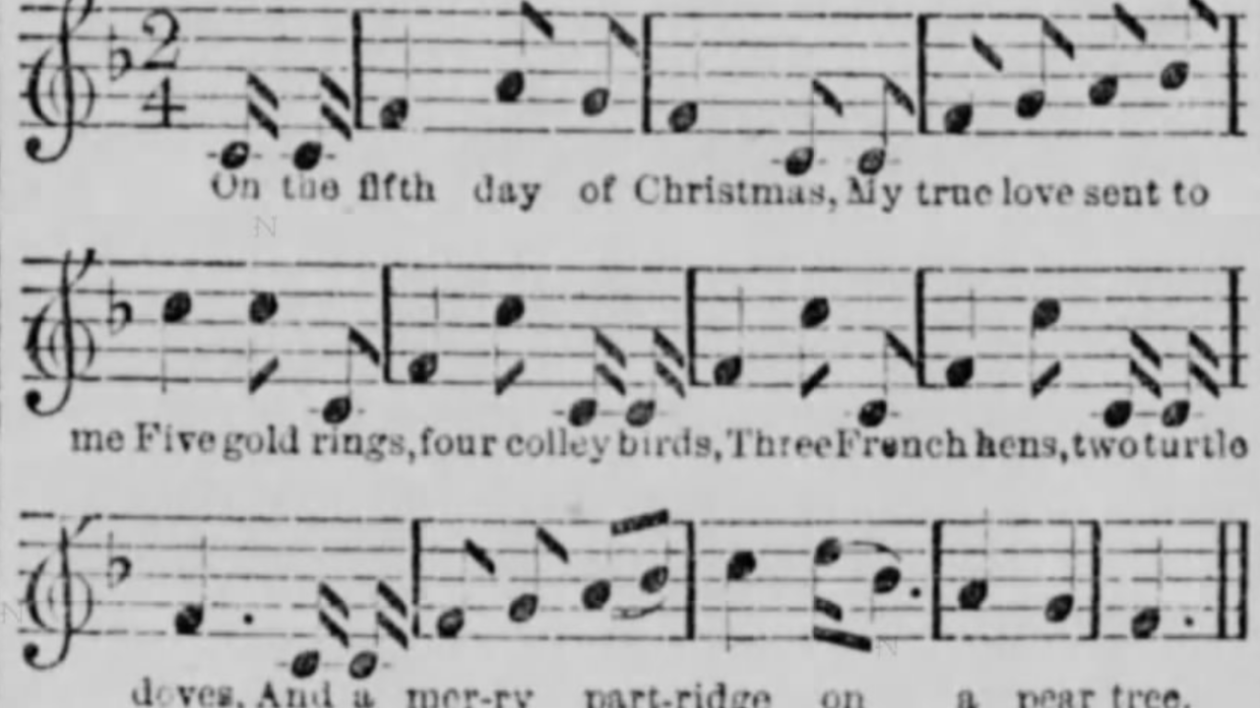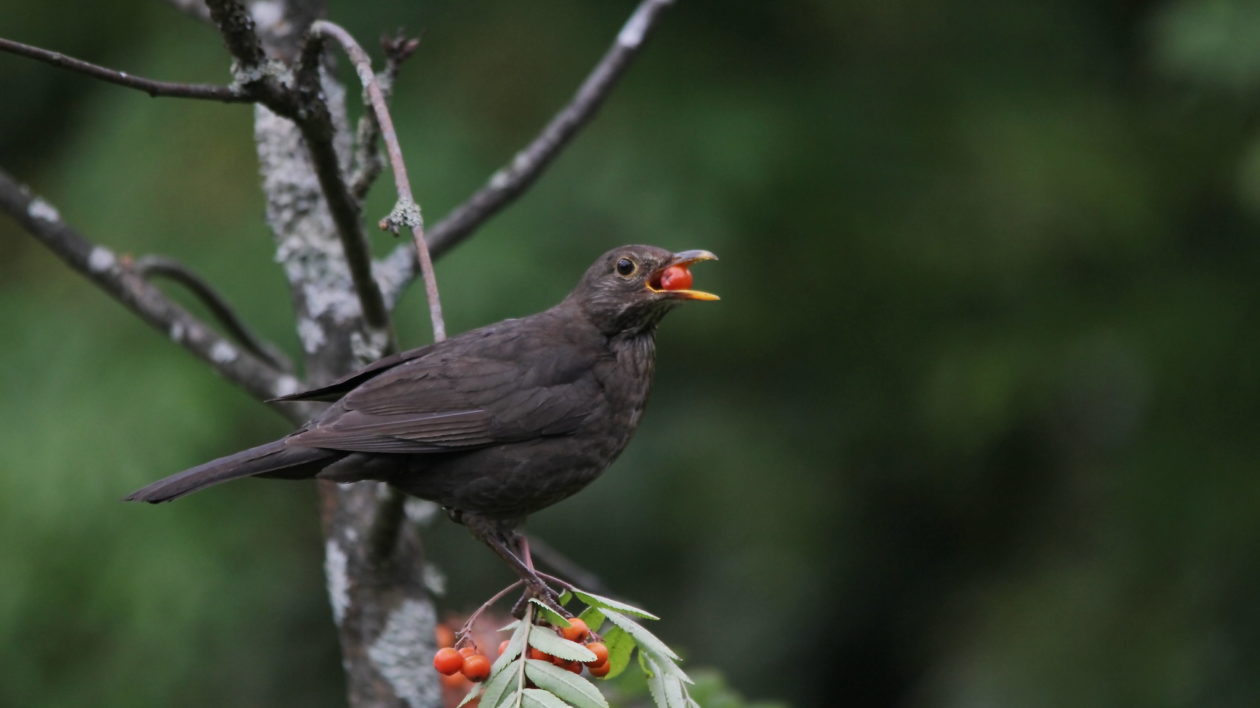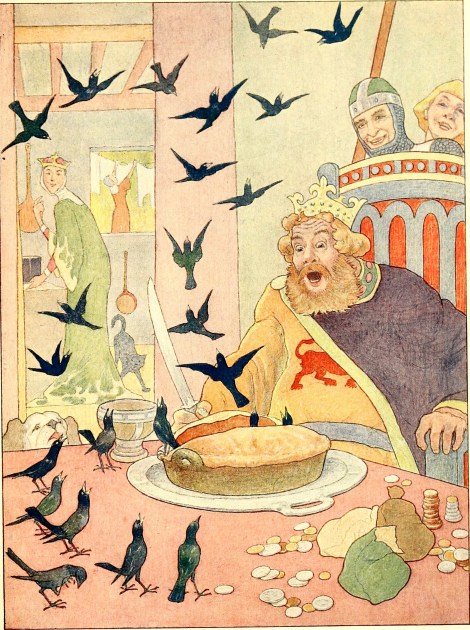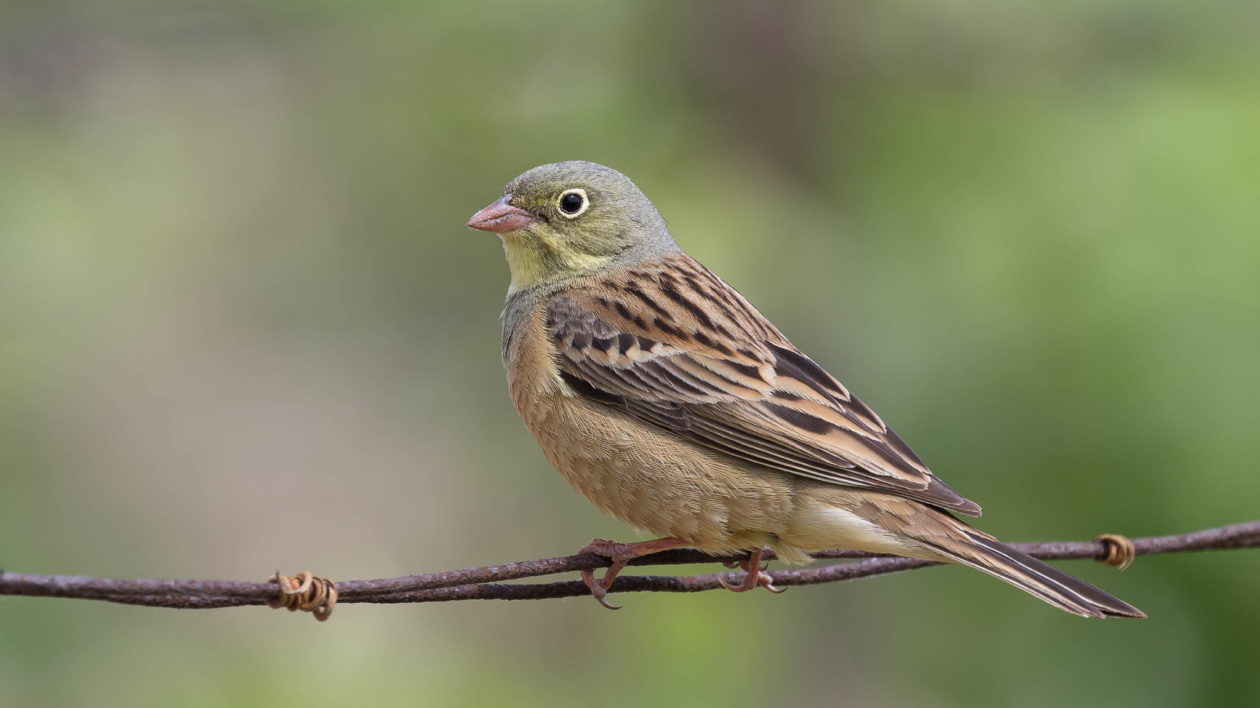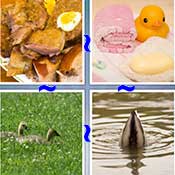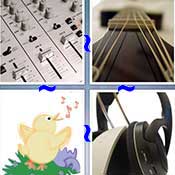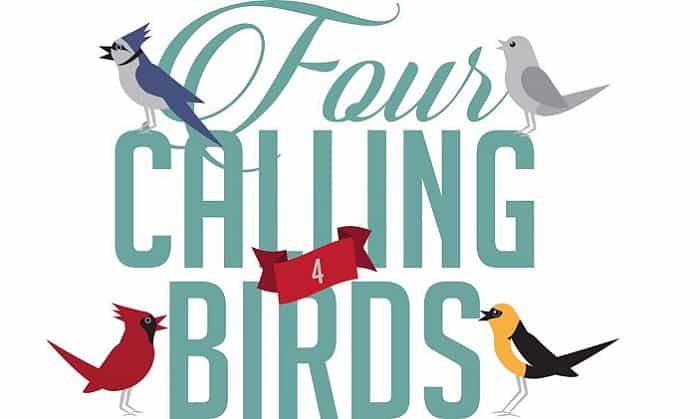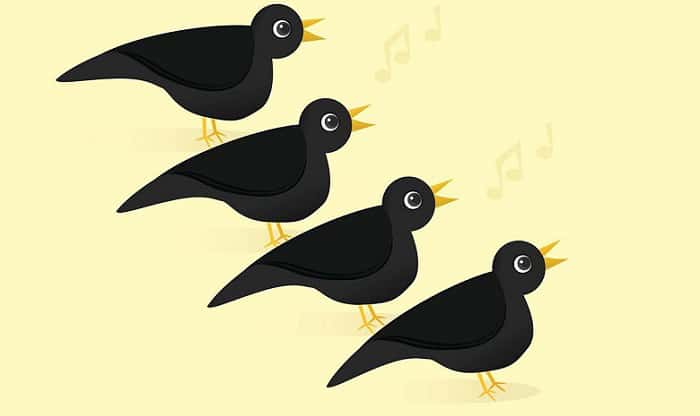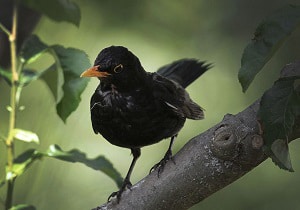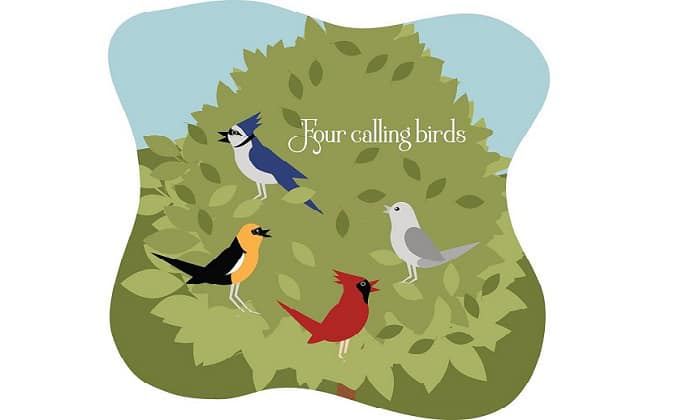This popular verse is a thought experiment of Abraham1 who is the Quranic epitome of questioning minds:
And when Abraham said, O my Sustainer, show me how you give life to the dead, He said: Have you then no faith? He said: Yes, but that my mind be reassured. He said: Then take four BIRDS, then fashion them towards you; then place them separately on every hill; then summon them: they will come flying to you; and know that God is Mighty, Wise. 2:260
It responds to the human curiosity about how life originates and regenerates from the non-living, and how God could potentially resurrect the dead.
Please look into the phrase “take four birds … then place them separately on every hill”. Here four birds remind us of the four basic elements (fire, water, air, earth) that the ancients believed the world and life to be composed of. Also, the number four reminds us of the four directions (east, west, north, south) and hence of all directions. Apparently, the phrase refers to the scattering of the moving particles/four basic elements, which constitute life2, into four/all directions after death.
Thus the four birds trained by Abraham symbolize the numerous atoms and molecules which, when rightly assembled, generate life and which – when the living matter dies and disintegrate into its original organic and inorganic constituents – go scattered in nature.
Here, like many other places, the Quran essentially portrays ‘self’ and ‘life process’ as an assembly of flying creatures/birds, i.e., an organization of moving particles arranged in a specific order (cf. 2:260, 19:93-94; 34:3, 34:7, 34:9, 34:22; 72:28).
This is in line with the Quranic position that life arises from death/dead material, while ‘living’ dialectically recycles with ‘non-living’ (3:27, 6:95-96, 10:24, 10:31, 16:65, 22:5-6, 22:73, 30:11, 30:19, 30:20, 30:24, 30:27, 43:10-12), a concept that is consistent with the current biochemical knowledge about life’s origin through a purely natural process from inorganic and organic particles.
What is more, the verse eventually argues from a metascientific perspective that is beyond the scope of science: Since all these flying creatures/birds/particles are allegedly ‘tamed’ by the divine law (note: “fashion them towards you”), they are always ready, as expected, to gather and re-assemble instantly under its ‘call’3 (“then summon them: they will come flying to you”; cf. 30:25). Evidently, an Omnipotent, Omniscient God is well able to bring the dead back to life, if He so wills (“know that God is Mighty, Wise”).
Then, because ‘BIRD’ in the Quran essentially refers to self and mind, as noted elsewhere, Abraham’s birds in 2:260 also symbolize the individual minds in a society, who, when organized by right guidance and reform, can as easily create a civilization out of ruins through their conscious, collective effort (cf. ‘birds’ in 38:19, 21:79, 27:16-17, 34:10; note birds associated with salat, 24:41). This interpretation is supported by its preceding verse 2:259 (cf. 2:258), i.e., The Parable of the Town in Ruins, which deals with social resurrection as it illustrates how God’s infinite creative power revives the dead, while giving life to a dead town or society4.
Remarkably, through this thought experiment, the Quran encourages scientific inquisitiveness and its associates – experiencing, experimenting and reasoning – as important steps towards attaining conviction.
Related articles:
Hearing, sights and senses as flying birds
Meaning of BIRD in the Quran
The Parable of the Town in Ruins
***********************************
Note 1
A literal reading of 2:260 has led traditional Muslims to understand the story as an instant, physical miracle where God made the birds alive, after they were cut into pieces, to demonstrate His power to Abraham. However, this understanding violates the consistent Quranic message that highlights the absurdity and futility of such instant miracles, because – not only that a temporary, physical miracle, though may serve only as a proof for those who witness it, means little to others – previous messengers were rejected by people despite those alleged miracles (17:59). Although, like any story, this story is also narrated in the past tense, it is actually a timeless parable with certain moral intent.
Note 2
When flying creatures/birds/particles are scattered (or separated from each other “on every hill”), they stay in nature as individualized dormant potential. According to the Quran, consciousness to various degrees is an intrinsic attribute of all created things (41:11, 41:21). Also, plants have life (35:9, 43:11, 7:57).
Note 3
Asad’s note on 2:260: My rendering of the above parable is based on the primary meaning of the imperative surhunna ilayka (“make them incline towards thee”, i.e., “teach them to obey thee”). The moral of this story has been pointed out convincingly by the famous commentator Abu Muslim (as quoted by Razi): “If man is able – as he undoubtedly is – to train birds in such a way as to make them obey his call, then it is obvious that God, whose will all things obey, can call life into being by simply decreeing, .Be!”‘
Note 4
This parable could have yet another meaning, if applied to individual level. By knowing and aligning the essential elements that constitute our existence, we experience life. When the same go scattered, this equals death. Then when we can call them back, after having been able to harness them, we get revived.
Salam
I do not know if brother Joseph has written an article on this question, but I do not find it.
in 2.260 we learn the story of Abraham and the proof of the resurrection from the death. Now my question: is the story about four birds (interpretation from asad) or is it one bird and a quarter of this bird, which was distributed to the mountains?
means it is not in the original Arabic
.. ‘ala kulli gabalin minhunna dschuzan? .. «
… on every mountain a part of them»…?
Thanks for the explanation.Peace
Logged
Logged
‘During times of universal deceit, telling the truth becomes a revolutionary act’
George Orwell
Salam Alaikum,
I think we should refer to the exposition of Parwez. He has given the following exposition for the verse;
2:260 Each Nabi has been confronted with the problem of giving life to a dead nation. For instance, Abraham faced such a problem and said to Allah: “What is the process by which new life may be infused into a dead nation?”. Allah asked him: “Do you not believe that dead nations may receive new life?”. Abraham said: “I do believe but I would like to know by what process, so that I can undertake it with full confidence.” Allah explained the process to Abraham through an example. He said: “Take four untamed birds. At first they will seek to get away from you. Make them familiar with yourself gradually. This will bring about remarkable change in them. Even if you set them free and call to them, they will come to you swiftly.” This is how you must patiently reform those who rebel against your call and bring them close to yourself and make them understand and appreciate the Divine System. This is how they will receive “life.” Most certainly Allah is All-Mighty, Wise.
The above explanation is very much convincing due to the following reasons
1. The previous verse 2:259 mentions about giving life to dead قَالَ أَنَّىٰ يُحْيِي هَٰذِهِ اللَّهُ بَعْدَ مَوْتِهَا (qala anna yuhyee hathihi Allahu baAAda mawtiha — When will God restore it to life after its death?), which is specifically related to giving life to a dead nation, not givin life to a dead being. Verse 2:260 also mentions about giving life to dead رَبِّ أَرِنِي كَيْفَ تُحْيِي الْمَوْتَىٰ — (rabbi arinee kayfa tuhyee almawta — show me how to give life to dead), which must be connected to the discussion in the previous verse as pointed out by Parwez.
2. Prophet Ibrahim would not ask Allah to show him how to give life to a dead being, especially while directly communicating with Allah. He will not ask such a silly question. It is like he is telling Allah his heart is not fully convinced about life after death, such a question is impossible from a prophet’s mouth. If such a question is asked by ordinary people we can understand that.
3. Nowhere in the verse it is mentioned cutting the birds into pieces, it is just an interpretation.
4. Allah’s request to Moses to take four birds and فَصُرْهُنَّ إِلَيْكَ fasurhunna ilayka (tame them) is very important. If the purpose was to show to Moses how to give life after cutting the birds into pieces, it is not necessary to tame them or make them feel familiar to Ibrahim. Allah could have shown him this miracle without taming the birds.
5. If the purpose was to show Ibrahim how to give life to a dead person, Allah could have selected any dead person and give life to him.
6. The question was specific «how to give life», if it was about how to give life to a dead being, even the example (which is interpreted to mean cutting the birds into pieces and giving life) does not teach «how to give life».
7. It is also important whether prophet Ibrahim did comply with the direction in the verse as per the meaning of the verse traditionally understood (to get fully convinced about life after death!)
There are some of the logical reasons to prove that the issue was not giving life to a dead being, but the issue was connected to give life to a nation, which was the primary duty of prophet Ibrahim. Allah was teaching a great principle using parable of birds, in a couple of sentences. The message hidden in this verse must be taken for a research topic. By the way, the character of our prophet must be understood in this context. About our prophet Allah says «If you were severe or hardhearted, they would have broken away from you’ (3: 159). This was the message Allah was teaching prophet Ibrahim, how to give life to a dead nation through making people get attached to him by mingling with them, sharing their sorrows and problems, giving helping hand to them, forgiving their sins, etc Once we have the confidence and trust of the people, we can make remarkable change in society.
Logged
The meaning which was lost in all our divisions will not be understood until our perceptions become untainted — Allama Iqbal
Salamun Alaikum Optimist.
Thank for sharing your thoughts. Please see my academic contentions with your presentation. I will look forward to your rebuttals to my contentions with a view to understand this topic deeper.
CONTENTIONS:
1 — When a parable is cited, it is usually cited to elucidate a central theme. Parables are not cited to support each other. So if I make a statement X, I will use parable Y and Z to explain ‘X’. The central argument ‘X’ is not found in the previous verse 2:259 as you seem to suggest.
Verse 2:259 and verse 2:260 are only ‘parables’ (‘Y’ and ‘Z’) which support the theme which is found in verse 2:258 (‘X). Verse 2:260 is not used to support 2:259 directly.
The central theme is established in verse 2:258 where God’s majesty and sovereignty was contested by a disbeliever along with God’s ability to give life and death only. Verse 2:258 by itself has nothing to do with a nation.
Therefore, I cannot support the central premise of your argument which I feel is unwarranted as is Parwez’s interpolation.
2 — What Prophet Abraham would and would not ‘ask’ and the appropriateness underlying it is not a judgment call for us to make. We can only establish testimony based on the evidence provided clearly by the Quran. If the Quran says X happened or Y said this, then as believers we believe that X happened and Y said it.
The comment that Prophet Abraham’s question would otherwise appear to be ‘silly’ is subjective and unwarranted. If this line of subjectivity is followed, other subjective questions can also be asked. For example: why did the Prophet Muhammad fear men when he should have rather feared God (33:37)? One could argue whether the Prophet should have known better? Do we now change the Arabic because the Prophet should have known better? Why did the Prophet make something unlawful when he had no authority to do so (66:1)? Why did he frown and turn away (80:1)? Why did Prophet Yunus abandon his people for a laden ship? The list can continue.
Prophetic actions and sayings (whatever they are) are a matter between them and God. They have been imparted for us to extract wisdom, not to deny them. We can only provide testimony on what is being narrated to us by God.
3 — The ‘portioning’ of the birds is strongly implied by the Arabic. The Arabic of 2:260 clearly imparts the instruction to take four of the birds (arba’atan mina-tayri). ‘kulli jabalin’ is clearly a reference to ‘each mountain’. So the inference would be to take four birds to four separate mountains and then to put a ‘juz’ on each of them. A ‘juz’ is basically a part or a portion of something. As the theme of the verse is resurrection and juz strongly suggests parts of the bird, hence it is usual to find renderings which mention cut pieces of the bird.
Please can you provide me strong evidence from the Arabic of verse 2:260 and the Quran alone, which clearly supports a better alternative explanation.
4 — The Arabic word ‘fasur’ from the verb ‘sara’ means to ‘incline’ or to ‘lean’ something or to twist or turn something to get them to do what you want. Therefore, in this context it means to incline or to summon towards oneself. This would be necessary if they were to be summoned from different places after they have been portioned ‘juz’. Otherwise why would they come towards him?
Similarly, on the Day of Reckoning, everything in the Universe will be summoned by God.
5 — Please can you provide me clear evidence based on the verses which proves that the purpose of the exercise was to simply show Prophet Abraham how God gives life to a dead person?
The ‘purpose’ was established in verse 2:259 to show God’s sovereignty and how He with His majesty, is able to do all things including resurrecting the dead on the Day of Judgment.
6 — Your assertion seems to be linked with point (5). If I cut something and it forms and comes back to life, what have I proven?
7 — I am not sure what point you are trying to make with this. Please elaborate.
At present, I respectfully find no cogent argument that provides clear evidence that verse 2:260 has anything to with bringing nations to life. I humbly feel such a premise is based on the faulty assumption that the two parables in 2:259 and 2:260 are linked with each other, rather than being linked by a common theme which is established in 2:258. Therefore, 2:260 has nothing to do with ‘nations’.
I look forward to your response.
Regards,
Joseph.
Logged
‘During times of universal deceit, telling the truth becomes a revolutionary act’
George Orwell
Wassalam,
Borther Joseph Islam, let us focus our attention to the Arabic words;
The Arabic of 2:260 contains instruction to take four birds (arba’atan mina-tayri), the word, mina (from) denotes that it can be from four different categories of birds. And then the command to fasurhunna ilayka “فَصُرْهُنَّ إِلَيْكَ. This is very important. You have said the Arabic word ‘fasur’ from the verb ‘sara’ means to ‘incline’ or to ‘lean’ something or to twist or turn something to get them to do what you want. Yes, to get to do what we want. That is why Usfur sawwar means the bird which comes at a call: as siwaar means a herd of cattle: (which follows the shepherd’s call), in the context of the verse 2:260 means familiarize these birds with yourself: make them your pets: make them so familiar that they come to you when called.
As you said ‘kulli jabalin’ is clearly a reference to ‘each mountain’. The inference is; you put them, a part of them, at any mountain. It is only just an interpretation that ‘juz’ on each of them refers to «pieces of birds» and in fact juz is the only word in the whole of the ayat that someone can conveniently interpret to mean pieces of birds, whereas “minhunna juzhan” can very clearly refers to ‘from the four birds a part’, ie. to put any bird (whether one or more as per his wish) on any mountain. There is no inference anywhere to cut the birds into pieces and if at all there was any instruction to cut the birds into pieces it would have been mentioned before the word “minhunna”. Before the instruction «to take from them» a part, the only instruction provided was fasurhunna ilayka which I explained above. The instruction as a whole refers to taking four birds and tame them (fasurhunna ilayka) and thereafter putثُمَّ اجْعَلْ ‘from the four birds a part’ (minhunna juzhan) at different mountains.
I agree with you the context of verse 2:258 is resurrection, but closely check verse 2:259, the discussion changes from individual’s life and death to resurrection of a nation from its death. The discussion is on a ruined city and its resurrection from death. Notice the question in the verse, how can the devastated, ruined city will be bought (ever) to life, after its death? In this context we should understand the next verse 2:260 how each Nabi has been confronted with the problem of giving life to a dead nation and a guidnace is mentioned from story of Ibrahim.
Logged
The meaning which was lost in all our divisions will not be understood until our perceptions become untainted — Allama Iqbal
Salam all together
i found a interesting statement in the NT
Verily, verily, I say unto you, Except a corn of wheat fall into the ground and die , it abideth alone: but if it die , it bringeth forth much fruit. 25 He that loveth his life shall lose it; and he that hateth his life in this world shall keep it unto life eternal. 26 If any man serve me, let him follow me; and where I am , there shall also my servant be : if any man serve me, him will my Father honour .
John 12:24
peace
Logged
Wassalam,
Borther Joseph Islam, let us focus our attention to the Arabic words;
The Arabic of 2:260 contains instruction to take four birds (arba’atan mina-tayri), the word, mina (from) denotes that it can be from four different categories of birds. And then the command to fasurhunna ilayka “فَصُرْهُنَّ إِلَيْكَ. This is very important. You have said the Arabic word ‘fasur’ from the verb ‘sara’ means to ‘incline’ or to ‘lean’ something or to twist or turn something to get them to do what you want. Yes, to get to do what we want. That is why Usfur sawwar means the bird which comes at a call: as siwaar means a herd of cattle: (which follows the shepherd’s call), in the context of the verse 2:260 means familiarize these birds with yourself: make them your pets: make them so familiar that they come to you when called.
As you said ‘kulli jabalin’ is clearly a reference to ‘each mountain’. The inference is; you put them, a part of them, at any mountain. It is only just an interpretation that ‘juz’ on each of them refers to «pieces of birds» and in fact juz is the only word in the whole of the ayat that someone can conveniently interpret to mean pieces of birds, whereas “minhunna juzhan” can very clearly refers to ‘from the four birds a part’, ie. to put any bird (whether one or more as per his wish) on any mountain. There is no inference anywhere to cut the birds into pieces and if at all there was any instruction to cut the birds into pieces it would have been mentioned before the word “minhunna”. Before the instruction «to take from them» a part, the only instruction provided was fasurhunna ilayka which I explained above. The instruction as a whole refers to taking four birds and tame them (fasurhunna ilayka) and thereafter putثُمَّ اجْعَلْ ‘from the four birds a part’ (minhunna juzhan) at different mountains.
I agree with you the context of verse 2:258 is resurrection, but closely check verse 2:259, the discussion changes from individual’s life and death to resurrection of a nation from its death. The discussion is on a ruined city and its resurrection from death. Notice the question in the verse, how can the devastated, ruined city will be bought (ever) to life, after its death? In this context we should understand the next verse 2:260 how each Nabi has been confronted with the problem of giving life to a dead nation and a guidnace is mentioned from story of Ibrahim.
Salamun Alaikum Optimist
RESURRECTION
With regards verse 2:259, you have agreed with me that the theme is ‘resurrection’ yet you have kindly asked me to look at verse 2:259 which is a parable to support the central theme of resurrection. The parable in verse 2:259 of the nation is not itself the theme. I made my contention with regards this point absolutely clear in my post above and in paragraph titled [1].
Please can you provide me clear evidence that the theme of which the parables found in verses 2:259 and 2:260 are elucidating is to ‘revive nations’. The parables themselves cannot be used to establish the theme as they are only elucidating the theme of resurrection. Such an assertion in my humble opinion would be unacceptable. They can only provide examples of a central theme not become the theme themselves.
FOUR BIRDS — QUALIFIED
I would have to strongly disagree with you as the matter of the word ‘juz’ is not simply one of a mere interpretation. Rather, it is a very strong interpretation suggested by the clear Arabic.
The primary meaning of ‘Juz’ in Arabic is the act of cutting or cutting off. Please see any authoritative lexicon for yourself.
The ‘Juz’ (definition — to cut, break off into parts or in portions) in my humble opinion, does not describe a part from a group (i.e. 1 or x birds from 4), especially when the group has been qualified into parts / numbers already (4 birds).
Rather, from a Quran’s perspective, the noun ‘juz’ inherently means a portion or part of an entity or a portion or part of an unqualified group.
So as an analogy (from a Quran’s perspective), I would not say «Here are 12 cats. Can you put a portion from them in the car». This would sound nonsensical and the word ‘portion / part / juz’ would never be used in this context as it would imply a part of a cat as the cats have already been ‘qualified’ into numbers. I would rather say for example «can you put 3 cats, 8 cats or 9 cats etc in the car» as they have already been qualified as 12 cats.
However, if I said ‘here are cats, please can you put a portion of them in the car», this would make sense as the unqualified group is now the complete entity (cats) of which the ‘portion / juz’ is a part. In this case, any number of cats can be put in the car.
This is supported by examples from the Quran.
015:044
«To it are seven gates: for each of those gates is a portion (Arabic: min-hum juz’un) assigned»
Here, the gates have been qualified into different gates — numbers / amounts (qualified) and each gate has a ‘portion’ (juz) assigned. The gate itself is not the portion (juz).
043.015
«But they attribute a portion (juz’an) from His slaves! …»
The slaves here are an unqualified group (any number), like the group of cats. So the ‘juz’ is usable in this context.
Similarly, the Quran does not say ‘take any birds and put a portion of them on the mountains’. It says take ‘4’ birds (qualified) and put a ‘portion’ of them on the mountains.
There is a difference.
I hope you can see my perspective.
Regards,
Joseph.
Logged
‘During times of universal deceit, telling the truth becomes a revolutionary act’
George Orwell
Assalamu alaikum,
I will say, your explanation, once we qualify a group into a specific number, we cannot use the word Juzan is not at all convincing. Imagine, we went together for shopping and you purchased 10 apples what does it mean when I ask you to give me a portion? Ok I can request you a specific number of apples. But when I request you a portion, it means it is your choice to decide on the number of apples. You cannot say my question is a nonsense question. Also, for instance, I tell you to take this 100 coconuts as gift from me and give a portion to my servant, here also I am giving you the choice to decide the number of coconuts. You can not insist that I should mention the number of coconut to be given to the servant. In the same way, here the choice is for prophet Ibrahim to decide on the number of birds and the mountain (notice even the mountain is not specific, “every mountain”). Therefore, in the context of the verses, it was not required to specify the number of birds and mountain. Of course Allah could have specified to put one bird on a specific mountain and another bird in another mountain, etc, which is actually not at all required (it would have sound bizarre if he was instructed something like this)
Also, the question you have not yet answered is this. Where is the instruction to cut the birds into pieces other than the word juzan you claim and trying to interpret to refer to pieces of birds. It is said Min hunna juzan (from them a portion) what does “hunna” here refers to? It clearly refers to birds. Nowhere before this word cutting the birds into pieces mentioned. You have also not given a proper and fair explanation for Fasurhunna, which I explained clearly what it means.
When a parable is cited, it is usually cited to elucidate a central theme. Parables are not cited to support each other. So if I make a statement X, I will use parable Y and Z to explain ‘X’. The central argument ‘X’ is not found in the previous verse 2:259 as you seem to suggest.
In verse 2:259, the central t theme is resurrection of a nation from dead. The central theme is how a devastated, ruined city will be bought (ever) to life, after its death. This is the question which is asked in the beginning of the verse. Then the resurrection of the city after death like situation for a 100 years is explained through a parable. I prefer the explanation of parwez. I quote “This issue as is known in history, after the destruction of Jerusalem by Nebuchadnezzar, the Bani-Isr’ael lived in captivity for about a hundred years. Then they were liberated and re-established in Jerusalem. This story has been narrated in the Quran symbolically”. Therefore, the central theme is not giving life to dead being, but giving life to a dead nation which is symbolically explained through a parable.
By the way, can you make a comment on my post in the following thread? I would like to know you further thoughts after reading my comments (Courtesy of course Parwez 
Logged
The meaning which was lost in all our divisions will not be understood until our perceptions become untainted — Allama Iqbal
Salamun Alaikum Optimist,
With respect, my purpose is not to convince you. My purpose is to provide an argument based on the Quran and I elucidated my claims about qualification with two verses of the Quran citing examples (15:44, 43:15).
The word in Arabic is not ‘portion’, it is ‘Juz’. They are not identical terms. My examples about cats was merely to give you an analogy in English and support my convictions established by the usage of ‘juz’ elsewhere in the Quran (15:44, 43:15). So what we may say about apples or coconuts in English in the 21st century is mute in the context of the Quranic usage of the word ‘juz’.
Whether you find it convincing or not is entirely your prerogative 
You have provided me no clear evidence why ‘juz’ implying cut is not the best explanation given the theme is resurrection and despite the Arabic words primary meaning to cut. Your only recourse is to suggest it means to resurrect nations based on 2:259 which is being contested as the parable in 2:260 is not explaining the parable in 2:259.
With respect, you keep missing this point about the parable. You are consistently citing 2:259 to establish the theme of the parables in 2:259 and 2:260. The theme of the parable is set in 2:258 which talks about general resurrection. Verse 2:259 and 2:260 are just separate parables explaining the theme of resurrection in two different ways.
It is clear to me from the posts hitherto, that you are going to support Parwez’s arguments which I am happy to critically evaluate on this forum only if time permits (God willing). However, we are seeking best arguments and thus far you have given me no clear reason why ‘resurrection of nations’ is the theme and not ‘resurrection’ alone.
If you do not address this specific point further, please accept my post the last on this matter as I will sadly see no value in continuing this discourse with you on this topic.
As to your request for my comments on another thread, I will take a look in due course, time permitting God willing. Please appreciate, that this forum is for everyone to participate and in their own time.
With regards ‘fasur’, I have already explained what it means. Please see: Reply #3 and section 4 of this thread. However, please can you provide evidence from notable lexicon authorities for your definition that «siwaar means a herd of cattle: (which follows the shepherd’s call)». In my understanding of Arabic, suwar is plural of ‘soorah’ which is used in the Quran to signify a form or shape. (40:64, 64:3, 82:8′). It is also used in Arabic for a sparrow that answers or responds to a call.
I have discussed the root of this word in more detail in another article:
THE TRUMPET IS BLOWN OR IS IT?
http://quransmessage.com/articles/the%20trumpet%20is%20blown%20or%20is%20it%20FM3.htm
Regards.
Joseph.
Logged
‘During times of universal deceit, telling the truth becomes a revolutionary act’
George Orwell
4 — The Arabic word ‘fasur’ from the verb ‘sara’ means to ‘incline’ or to ‘lean’ something or to twist or turn something to get them to do what you want. Therefore, in this context it means to incline or to summon towards oneself. This would be necessary if they were to be summoned from different places after they have been portioned ‘juz’. Otherwise why would they come towards him?
Similarly, on the Day of Reckoning, everything in the Universe will be summoned by God.
Assalam alaikum,
Kindly consider our discussion as positive. I do not want to impose my views on you just like you do not want to impose your views on me. I touch my heart and tell you I am open to accepting your views if you can convince me. I never blindly accept the views of any scholars. That is why regarding the miracles issue I told you I can not answer your comments at the moment. I am fully aware I am answerable to Allah for whatever posts I make here. I can not even imagine misrepresenting anything. No scholar is going to rescue me from Allah’s questioning.
Well, earlier I did not make any specific comment on this. Since you have asked me to check this comment, I want to tell you the followings.
I find the above explanation very strange. I agree with you the Arabic word ‘fasur’ from the verb ‘sara’ means to ‘incline’ or to ‘lean’ something or to twist or turn something to get them to do what you want. You yourself has mentioned suwar is used in Arabic for a sparrow that answers or responds to a call. I had pointed out this meaning in my post. So the contexual meaning you can not deny that fasurhunna means to make them so familiar that they come to us when called. In other words, make them «incline» or «lean» towards us so that we can get them to do what we want (initially when we take birds they will be hesistant to incline towards us, and this shows the reason for the command fasurhunna). The point is very clear.
However, you are here saying that the contexual meaning is; «in this context it means to incline or to summon towards oneself». You further said «this would be necessary if they were to be summoned from different places after they have been portioned ‘juz’.» My question is; how come they were to be summoned from different places after they haved been cut into pieces? After prophet Ibrahim took the birds, they are with him. If he had cut the four birds into pieces all the pieces of birds are still with him. Are suggesting that the instruction for «fasurhunna ilayka» is after cutting the birds into pieces? This is quite strange. I am totally unable to understand what surhunna you are here referring to. Are you referring to collecting the pieces of birds? Then you will spoil the meaning of the word fasurhunna. The issue of summoning is mentioned only after putting them on the mountains.
With respect, my purpose is not to convince you. My purpose is to provide an argument based on the Quran and I elucidated my claims about qualification with two verses of the Quran citing examples (15:44, 43:15)
With all respet to you, I politely disagree with your connecting verse 2.260 with 15:44 & 43:15 and making a case. You may compare Verse 43:15 «And they assign to Him a part of His servants (as His children)» وَجَعَلُوا لَهُ مِنْ عِبَادِهِ جُزْءًا with Minhunna Juzhan in 2.260 (from them a part). Here the usage minhibadihi juzhan and minhunna juzhan actually support my case. I can not find any logic in your arguement (explained to me through the example of the cats) that since the birds are catergoried as four birds (and assuming my case the birds are not cut into pieces), it is nonsensible to mention «from them a part». I have even verified with a few and asked them if we assume the birds are not cut into pieces, whether there is a gramatical error in the usage «minhunna juzhan» to denote «from the birds a part» and they told me there is no gramatical error. The verse you pointed out «min hibadihi juzhan» for sure can not refer to pieces of Allah’s servants. Suppose imagine I have several grocery shops and I purchased 1000 pens and I requested my staff to put a part of them in every shops. The only thing is that I am not specifying the number and my staff has the discretion to decide the number. Your are implying by the example if Allah was referring to 4 birds, Allah would be mentioning «put from them one, (two or three, etc) on every mountain». Not really convincing, considering also the instruction for fasurhunna after taking four birds. Please note, after the instruction for fasurhunna the immediate instruction is ثُمَّ اجْعَلْ ‘thereafter’ put from them a portion at every mountain», no killing and cutting the birds into pieces is mentioned. If cutting the birds into pieces was instructed it would have been mentioned after fasurhunna. Actually fasurhunna loses its meaning if the birds are needed to be cut into pieces after they are caught.
Please take my comments positively. I have started reading many of your posts here and I liked lot of your comments. Please no harsh thoughts about me. I am only politely disagreeing with you.
Assalamu alaikum
Logged
The meaning which was lost in all our divisions will not be understood until our perceptions become untainted — Allama Iqbal
Salamun Alaikum Optimist.
Thank you for your very pleasant demeanour in your post which I truly respect
The point of the parable in 2:260 is to show Prophet Abraham how God resurrects from the dead. This is clear from the question at the start «Show me, Lord, how You will raise the dead». So someone or something has to die in verse 2:260 for the parable to work. There is no use connecting 2:260 with verse 2:259 as verse 2:260 is a separate parable.
So my question is: So how do the birds die?
If the birds do not die, then there is no parable. Please try to understand my contention with your argument.
(1) He took four birds
(2) Made the birds respond to his call
(3) Put a portion / part ‘Juz’ of them on each mountain top / hill
(4) Then called them back
(5) They responded and came back to him
So how does this prove resurrection? Clearly between [2] and [3] there is an implied action. Otherwise, how do the birds die?
Remember, this is a parable that stands alone to prove resurrection.
Regards,
Joseph.
Logged
‘During times of universal deceit, telling the truth becomes a revolutionary act’
George Orwell
4I touch my heart and tell you I am open to accepting your views if you can convince me. I never blindly accept the views of any scholars. That is why regarding the miracles issue I told you I can not answer your comments at the moment. I am fully aware I am answerable to Allah for whatever posts I make here. I can not even imagine misrepresenting anything. No scholar is going to rescue me from Allah’s questioning.
On a side note, I wanted to point out this great sentiment MashAllah of Optimist’s which we should all (including me first) be conscious of at all times. We should always be receptive to a better argument and not follow blindly the views of anyone. In the end, we are all answerable to God alone. Reminders like this are good for everyone.
017.036
«And do not follow that of which you have no knowledge. Indeed! the hearing and the sight and the heart — of each of these you will be questioned»
I felt it was worth pointing out separately. Thanks for sharing.
Peace.
Logged
‘During times of universal deceit, telling the truth becomes a revolutionary act’
George Orwell
Assalamu alaikum,
Thank for your above two posts. Let me ask you only one question;
What is the relevance of the discussion about a ruined city in verse 2.259 and the exclamation how come this ruined and destroyed city could be ever resurrected to life again after its death?
I look forward to your answer before making any further comments
Kind regards
Logged
The meaning which was lost in all our divisions will not be understood until our perceptions become untainted — Allama Iqbal
Salamun Alaikum Optimist,
The parable attempts to show through the narrative one of the ways God resurrects from the dead.
To show this example to an individual before the Day of Judgment, something out of the ordinary must have to happen. Sleeping for a 100 years is not ordinary (2:259), neither is sleeping for an extended number of years as in the narratives of Surah Kahf, ordinary. These are extraordinary events.
Now if:
[A] One does not want to accept that God can temporarily suspend / alter / interfere with the laws He himself has created as and when ‘He so wills’ to manifest a particular truth, then not only do we deny God’s attributes such as «He does what He wills», «He will not be questioned as to that which He does», «When He decrees a matter, He only says «BE!» and is» we also limit God’s capacity and have to find imaginative ways to avoid the literal testimony of the Quran and turn it into riddles to explain it.
Dear brother, as I trust you will agree, turning the Quran into riddles or attempting semantic gymnastics (as I have noted some others do) to explain a literal narrative of the Quran goes against its own testimony that the ‘Quran has no crookedness» (18:1) and that it is easy to understand.
If we simply accept that [A] is possible and that God can ‘suspend’ His laws IF he so Wills, then literal interpretations become easier.
In my humble opinion, this is the crux of the matter. Some just do not want to accept [A].
Now as I accept [A], I accept the clear literal testimony of the Arabic words revealed by God that:
(i) Man passed by a town in ruins
(ii) He questioned how any of what he saw could be raised again (a question of resurrection — which is the central theme which the parable attempts to elucidate)
(iii) He was then put to sleep for a 100 years [extraordinary event]
(iv) He was awoken [extraordinary event]
(v) He questioned to himself how long he had slept
(v) To make him realise how long he had slept, he was inclined to look at his food and drink which were fresh and the ass which were by now bones (due to the 100 years).
If he could be awoken after such an unnatural period of time, then God can clearly resurrect the dead. If there was nothing extraordinary in the events, then the ‘extra ordinary question regarding resurrection’ becomes futile.
Now I have elaborated this literal understanding in another thread. Please see:
http://quransmessage.com/forum/index.php?topic=257.0
…and reply #11.
However, I think the most important question is:
Are we willing to accept [A] or not? If we are not, then I humbly feel there is no point of continuing this discussion as on this point, you and I will be arguing from mutually exclusive theological positions.
With utmost respect,
Joseph.
Logged
‘During times of universal deceit, telling the truth becomes a revolutionary act’
George Orwell
Now if:
[A] One does not want to accept that God can temporarily suspend / alter / interfere with the laws He himself has created as and when ‘He so wills’ to manifest a particular truth, then not only do we deny God’s attributes such as «He does what He wills», «He will not be questioned as to that which He does», «When He decrees a matter, He only says «BE!» and is» we also limit God’s capacity and have to find imaginative ways to avoid the literal testimony of the Quran and turn it into riddles to explain it.
Dear brother, as I trust you will agree, turning the Quran into riddles or attempting semantic gymnastics (as I have noted some others do) to explain a literal narrative of the Quran goes against its own testimony that the ‘Quran has no crookedness» (18:1) and that it is easy to understand.
If we simply accept that [A] is possible and that God can ‘suspend’ His laws IF he so Wills, then literal interpretations become easier.
In my humble opinion, this is the crux of the matter. Some just do not want to accept [A].
However, I think the most important question is:
Are we willing to accept [A] or not? If we are not, then I humbly feel there is no point of continuing this discussion as on this point, you and I will be arguing from mutually exclusive theological positions.
With utmost respect,
Joseph.
Wa alaikumussalam,
This is a very interesting dicussion. Brother, can you read the following link related this issue and provide me your comments (I am patient to wait if you need time). I believe it will a learning process for me and you might be coming across with a different analysis to make a scrutiny. Thank you for your patience. This is from Kitabu taqdeer by parwez and there are actually different chapters relevant, but I am requesting you at the moment only this chapter.
http://www.tolueislam.org/Parwez/kt/kt_10.htm
Thanks & kind regards
Allah bless you
Logged
The meaning which was lost in all our divisions will not be understood until our perceptions become untainted — Allama Iqbal
The popular holiday tune “The Twelve Days of Christmas” is a bird lover’s delight. If you’re counting, the lucky recipient ends up with 23 birds by the end of the song. And maybe more: some believe the “5 golden rings” is a reference to the rings of ring-necked pheasants.
Most of the birds listed are fairly standard barnyard fowl: the geese and swans and hens and doves.
But others are a bit less clear. Last week, I looked into possible candidates for the “partridge in a pear tree.”
Next question: What are the calling birds? Upon reflection, that seems incredibly vague. After all, all birds call in some form or another. Is there a specific bird the song is referencing?
The answer may not be what you think.
Changing Lyrics
“Twelve Days” was first published in 1780, but it existed as an oral tradition long before that. And even after it was published, the song was most often just passed down from generation to generation. Over time, lyrics change.
In the original published version, it’s “4 colly birds” not “4 calling birds.” In England at the time, “colly birds” was a name given to blackbirds. I’ll delve into this a bit more in a moment.
First, though, I do find it reassuring that botching song lyrics has a long history. I have had this tendency for decades. In high school, I always heard the John Mellencamp lyric “R.O.C.K. in the USA” as “honor rolling seeking in the USA.” Yes, the ever-popular 80s pop song about academic achievement. No one who knew me then would be all that surprised that I’m sitting here today writing about holiday blackbirds.
The other reality is that the song has just changed to better fit the times. While traditionalists never want to hear this, popular songs, stories and holidays shift and morph through the years.
Earlier versions of “Twelve Days” included some completely different lyrics, including “bears a baiting.” This referenced the then popular “sport” of tying up a bear, then having fighting dogs attempt to maim and kill it. Obviously, this would today be considered a holiday buzzkill.
As the term “colly bird” became unfamiliar to listeners, it’s natural they would replace it with the more familiar “calling birds.” It has a nice ring to it even if it’s a big vague.
However, the original version of “colly birds” – a gift of blackbirds – raises its own questions.
World’s Worst Party Trick
As impractical as it may be, a gift of 7 swans undeniably carries a bit of romance to it. Four blackbirds? Not so much. Why would this be in the song?
The blackbird (Turdus merula) is a common thrush in England and Europe. As a folk song-worthy gift, it might not be as weird as it first appears. After all, this gift could be turned into a pie.
Remember the nursery rhyme? “Sing a song of sixpence, a pocketful of rye, four and 20 blackbirds baked in a pie. When the pie was opened, the birds began to sing. Now wasn’t that a dainty dish to set before a king?”
This nursery rhyme itself may have hidden political meanings, but it also illuminates an actual royal fad: live blackbird pie. Yes, this was a thing.
As naturalist Jim Hurley points out, at one point it was a big hit to hide a bunch of live songbirds under a pie crust, then serve it at a banquet.
As Hurley writes, “The creation was carried to the table, the outer crust of the pie was opened and to the delight of the assembled guests the birds flew out calling as they escaped from their confinement within the outer pastry casing.” Please don’t try this at home.
Eating Blackbirds
“Colly birds” most commonly refers to blackbirds, but it can also be a catch-all term for any small songbirds. Songbirds, including blackbirds, would have been a common menu item at the time of the song’s origin.
Four colly birds would not have made much of meal, to be sure. But thrushes were often eaten whole, bones and all. Sometimes they were baked in a pie.
If this seems strange or gross, consider this: Songbirds are still extensively hunted for food in many parts of the world. Songbirds migrating from Europe to North Africa face a gauntlet of guns and traps, especially in the Mediterranean region.
According to an article in The Guardian, between 11 million to 36 million songbirds are killed or captured in Mediterranean countries each year. In Italy, where some 5 million songbirds are poached annually, people use live birds as decoys to lure various songbird species into elaborate nets and other traps.
Birds are hunted in these countries for food, for the market and for sport. They are also hunted because it is a tradition. But traditions, like holiday songs, can and do change. The hunting of songbirds presents a tremendous threat to these species. Bird advocates are working to end this carnage. Perhaps one route – being taken in countries like Lebanon – is working with hunters to develop limits and ban destructive practices. This would allow a small, sustainable take, and continue traditions, much as “gamebirds” are managed.
Regular readers of Cool Green Science tend to love birding and feeding backyard birds. Birds are a delight, a passion, and perhaps even the reason you’re a conservationist. Birds have always been important to people, in myriad and complex ways. Those complex relationships continue to unfold.
There are hints of our past relationships with birds still among us…sometimes hidden in the lyrics of a popular song.
The next time you hear “The Twelve Days of Christmas” you can imagine blackbirds flying away. Just don’t get any ideas about hiding them underneath a pie crust.
Whats The Word
Published on March 23rd, 2015 |
by What’s The Word Answers
1,485
Whats the Word answers and cheats for words with 4 Letters in the popular game for iOS and Android by developer RedSpell. Having trouble beating a level of Whats the Word, like palm? This page has all the Whats the Word answers and cheats to help you beat the game.
Whats the Word 4 Letters
Related Posts
Tags: answers, cheats, what’s the word cheats, whats the word 4 Letters, whats the word answers
Back to Top ↑
-
Search All Game Cheats:
-
4 Pics 1 Word Answers by Letter:
- 4 Pics 1 Word 9 Letters
- 4 Pics 1 Word 8 Letters
- 4 Pics 1 Word 7 Letters
- 4 Pics 1 Word 6 Letters
- 4 Pics 1 Word 5 Letters
- 4 Pics 1 Word 4 Letters
- 4 Pics 1 Word 3 Letters
-
All 4 Pics 1 Word Levels:
- Level 1
- Level 500
- Level 1000
- Level 1500
- Level 2000
- Level 2500
- Level 3000
- Level 3500
-
Whats The Word Answers
These are all the answers to Whats The Word game for iPhone, iPod, iPad and Android. To play What’s The Word, you must guess the common word between four images shown on your screen. Several developers have created versions of this new photo word game – RedSpell, LOTUM GmbH (4 Pics 1 Word), Itch Mania, and Emerging Games. Each of these apps are equally challenging, so if you need help on a level of Whats The Word, these cheats will help you solve the puzzle. Here you can search through all levels of all versions of What’s The Word, browse by the number of letters in a word, or search for the word based on the four images on your screen.
The delightful tune of “Twelve Days of Christmas,” which was first published in 1780, will soon enchant everyone once more.
But, what are four calling birds? From its original lyrics, it was written as “four colly birds,” which was an archaic name given to blackbirds. But there’s more to it!
Continue reading as we travel through time and discover amazing facts about the 4 colly birds.
Table of Contents
- What to Know About Four Calling Birds
- Fact#1: The history of lyrical revisions.
- Fact#2: The four Gospels
- Fact#3: The meaning behind “colly.”
- Fact#4: The sound of 4 calling birds.
- FAQ
- Conclusion
What to Know About Four Calling Birds
On the fourth day of Christmas, the four calling birds were mentioned in the carol entitled “Twelve Days of Christmas.” In this article, we will provide you with 4 historical facts about these birds!
Fact#1: The history of lyrical revisions.
Considering how long ago the year 1780 was, the 12 days of Christmas lyrics have undergone numerous changes over time in an effort to appeal to more people.
While some historians believe that the lyrics are French in origin, the song was first seen in the English children’s book written by Mirth With-out Mischief.
But In this modern day, the famous and familiar lyrics we often hear were written in 1909 by an English writer named Frederic Austin.
Included in his revisions are the changing of “4 colly birds” to “4 calling birds” and the rhythm of “five go-old rings.”
Along with 3 french hens, the five golden rings’ lyrics are also believed to initially relate to the necks of ring-necked pheasants rather than actual rings, continuing the song’s motif of feasting on calling birds Christmas.
Fact#2: The four Gospels
The famous Christmas carol is initially intended as a romantic “memory-and-forfeit” game in England for British children to play in order to test their retention.
But from 1558 to 1829, practicing Catholicism in the said country was considered a crime. Thus, the carol was also believed to be Christian’s way of learning the tenets of their religion.
Accordingly, the four calling birds symbolize the four gospels of Matthew, Mark, Luke, and John, which remind the people that God sent Jesus as the world’s savior.
Fact#3: The meaning behind “colly.”
The term “collie” or “colly” from its original lyrics has a definition of black as coal and was used as an English slang word that translates to blackbirds.
But why was the blackbird chosen for this song? This is simply because a blackbird (Turdus merula) is a common passerine in the land of Europe and England.
However, the original version could also have a meaning as a “gift of blackbirds.”
In this sense, the blackbirds would be perfect as a gift ideas to be served as a meal (all including its bones) or as a pie that can bring delight to the table.
Fact#4: The sound of 4 calling birds.
Roundheads and pointed wings characterize blackbirds. They have black plumage with a touch of yellow on their eyes and beaks.
Most importantly, these calling birds sound will entice you with their “strangled” low and melodic, and beautiful songs.
Images of Blackbirds
FAQ
What bird is a calling bird?
Calling birds actually came from the word “Colly Birds,” which means Blackbirds. Thus, a calling bird is a blackbird.
What are the 4 birds in the 12 days of Christmas?
The 4 birds or the 4 calling birds refer specifically to a typical English thrush called a blackbird with a scientific name of Turdus merula.
What do the calling birds represent?
The calling birds could represent the four gospels of Matthew, Mark, Luke, and John or the evangelists themselves. It is believed that their “true love” is God or Jesus Christ.
What do the 3 french hens represent?
These represent the values of Christianity – Faith, Hope, and Charity.
What do the five golden rings represent?
Five golden rings reflect the first five books from the Old Testament of the Christian Bible.
Is 12 days of Christmas a love song?
The famous Christmas carol is possibly a love song. All the gifts can be given to a woman, including the dancing ladies, as a wedding sign. But if you consider following this song to woo your lover, imagine how chaotic it will be to receive a total of 23 birds!
Conclusion
The captivating carol of “The Twelve Days of Christmas” will be around the corner or even in every podcast. But you are lucky that you now know what are four calling birds.
From its long and rich history of stories and lyrics revisions, you can now share that “four colly birds” refers to the blackbirds or the four evangelists named Matthew, Mark, Luke, and John.
Should you want to learn more about the symbolisms in the 12 days of Christmas, don’t hesitate to share your thoughts.



